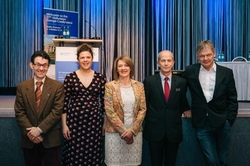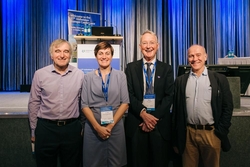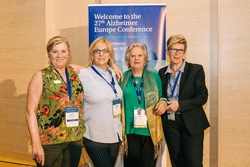Berlin, 3 October 2017 – The focus of today’s sessions at the Alzheimer Europe Conference was on the experience of living with dementia and the importance of innovative care in supporting people with dementia and their carers. The impact of dementia
 The first plenary session “The impact of dementia on the whole family” was delivered by Chris Roberts and his wife Jayne Goodrick (Wales, United Kingdom). They shared their experience of receiving a diagnosis and how this diagnosis impacted Chris, his wife and his family and how they all had to learn how to “live with dementia”. They highlighted that dementia seriously challenges the whole family dynamic and relationships and can cause total breakdown, as well as a lot of guilt and blame. They shared how they learned to overcome these challenges and how important their advocacy work on behalf of other people with dementia has become. As a fitting conclusion, they highlighted: "We continue to do what we know best: be husband and wife rather than patient and carer". The first plenary session “The impact of dementia on the whole family” was delivered by Chris Roberts and his wife Jayne Goodrick (Wales, United Kingdom). They shared their experience of receiving a diagnosis and how this diagnosis impacted Chris, his wife and his family and how they all had to learn how to “live with dementia”. They highlighted that dementia seriously challenges the whole family dynamic and relationships and can cause total breakdown, as well as a lot of guilt and blame. They shared how they learned to overcome these challenges and how important their advocacy work on behalf of other people with dementia has become. As a fitting conclusion, they highlighted: "We continue to do what we know best: be husband and wife rather than patient and carer".
The importance of “Home care in dementia – relief for caregivers and support for care-receivers” was introduced by Prof. Elmar Gräßel from the University Hospital Erlangen (Germany). He highlighted that more than 50% of carers are at risk of reduced physical health because of their caregiver role. He presented the range of support and respite services which are available for carers but stressed that carers need to be motivated to use these services. The implementation of non-pharmacological therapies in different settings was another important priority presented by Prof. Gräßel. The third speaker, Imogen Blood (United Kingdom) gave an update on “The European Joint Action on Dementia and its focus on dementia-friendly communities and initiatives”. She presented the findings and key conclusions of the report commissioned by the UK Department of Health. According to her, the focus of dementia-friendly community initiatives should be on removing barriers in order to promote the inclusion of people with dementia in the ordinary day-to-day life of their communities. People with dementia involved in her research said that it was important for them to “continue to be me” by doing “normal”’ things. Having opportunities to make a contribution and having a say in the design, delivery and evaluation of dementia-friendly initiatives is also important. Key to the success of these initiatives is a broad alliance – a “social movement” which gathers and responds to the experiences and priorities of local people with dementia and their supporters, and builds on local resources and networks to raise public awareness and improve the physical environment. Prof. Thomas Klie from the University of Freiburg (Germany) concluded the first plenary session with his presentation on the “Ethical and legal considerations in the care of people with dementia at home”. Although life and care at home are preferred by most individuals, this exposes people with dementia and carers to particular strains. As a result, questions regarding human rights issues in care and fairness in the distribution of care tasks arise. To address these, Prof. Klie advocated for a “Caring Community” with a mix of informal, professional and voluntary help focusing on providing efficient care and case management. Dementia care in the 21st century  The second plenary session entitled “Dementia care in the 21st century” started with an overview by Dr Anders Wimo from Karolinska Institutet (Sweden) on “The cost of dementia care”. According to him, 47 million people in the world lived with dementia (about 10.5 million in Europe) in 2015 and these numbers are expected to increase to 75 million in 2030 and 132 million in 2050. The socioeconomic impact is enormous with global costs estimated at USD 818 billion in 2015 of which 40% are due to informal care. The second plenary session entitled “Dementia care in the 21st century” started with an overview by Dr Anders Wimo from Karolinska Institutet (Sweden) on “The cost of dementia care”. According to him, 47 million people in the world lived with dementia (about 10.5 million in Europe) in 2015 and these numbers are expected to increase to 75 million in 2030 and 132 million in 2050. The socioeconomic impact is enormous with global costs estimated at USD 818 billion in 2015 of which 40% are due to informal care.
Prof. Knut Engedal from the University of Oslo (Norway) gave his presentation on “Care guidelines and national dementia strategies” and stressed that such strategies should be based on important ethical principles such as autonomy and dignity and the framework of person-centred care. In countries with strategies, the awareness of dementia in the public has been improved, more people with signs of dementia have received a diagnosis and more people have had access to services according to their needs. Another way of developing high-quality care for people with dementia is to establish national care guidelines, based on the best evidence from the literature. However, it is of importance that care guidelines and dementia strategies are anchored at national social and health authorities and that politicians are willing to finance public services that are recommended by the care guidelines and strategies. Prof. Bob Woods from Bangor University (United Kingdom), presented top line results from a five country survey on “The experience of carers of a diagnosis of dementia”. Over 1,400 carers of people with dementia in the Czech Republic, Finland, Italy, the Netherlands and Scotland (UK) responded to a survey which was supported by an educational grant from Roche to Alzheimer Europe. The survey looked at first indications that led to carers seeking help, the role of different healthcare professionals in the diagnosis, existing barriers to diagnosis, the disclosure of the diagnosis to the person and carers and the provision of information and signposting to other services and post-diagnostic support. More details on this survey are available in a press release issued during the conference. Prof. Lieve Van den Block from the Vrije Universiteit Brussel (Belgium) presented the “PACE project and its implications for palliative care for people with dementia” and stressed that the provision of high-quality palliative care should be a priority for nursing and care homes in Europe. The EU-funded PACE project studying palliative care in Belgium, the Netherlands, England, Finland, Poland and Italy found that the quality of end-of-life care for people with dementia in nursing homes and nursing home staff’s knowledge of palliative care must be improved. European Working Group of People with Dementia (EWGPWD): “We continue to be ourselves”  An additional highlight of the day was a symposium organised by AE’s European Working Group of People with Dementia at which four people with dementia participated and shared their perspectives and lived experience: Idalina Aguiar (Portugal), Amela Hajrič (Bosnia and Herzegovina), Carol Hargreaves (Scotland, UK) and Helga Rohra (Germany). The positive message conveyed by all four speakers was that, although they meet with losses of competence and skills, they “continue to be themselves”, persons still able to contribute to society, still able to do things for themselves, still able to feel, laugh, work, take part in everyday life. In order to be able to do so, they felt that people with dementia need appropriate and timely support and a more inclusive society. An additional highlight of the day was a symposium organised by AE’s European Working Group of People with Dementia at which four people with dementia participated and shared their perspectives and lived experience: Idalina Aguiar (Portugal), Amela Hajrič (Bosnia and Herzegovina), Carol Hargreaves (Scotland, UK) and Helga Rohra (Germany). The positive message conveyed by all four speakers was that, although they meet with losses of competence and skills, they “continue to be themselves”, persons still able to contribute to society, still able to do things for themselves, still able to feel, laugh, work, take part in everyday life. In order to be able to do so, they felt that people with dementia need appropriate and timely support and a more inclusive society.
For further information, contact: Jean Georges, Executive Director of Alzheimer Europe, 14, rue Dicks, L-1417 Luxembourg, Tel.: +352-29 79 70, Fax: +352-29 79 72, jean.georges@alzheimer-europe.org Notes to editors: Alzheimer Europe is the umbrella organisation of national Alzheimer associations and currently has 39 member organisations in 34 European countries. (www.alzheimer-europe.org). The European Working Group of People with Dementia was set up in 2012 by Alzheimer Europe. The group is composed entirely of people with dementia who are nominated by their national Alzheimer associations. They work to ensure that the activities, projects and meetings of Alzheimer Europe duly reflect the priorities and views of people with dementia. The group operates independently, with members electing their own Board and setting an agenda of activities: http://www.alzheimer-europe.org/Alzheimer-Europe/Who-we-are/European-Working-Group-of-People-with-Dementia  The European Joint Action on Dementia is a collaborative project between EU Member States coordinated by the Scottish Government and funded by the EU health programme and focusing on timely diagnosis and post-diagnostic support, crisis and care coordination, residential care and dementia-friendly communities: http://www.actondementia.eu/ The European Joint Action on Dementia is a collaborative project between EU Member States coordinated by the Scottish Government and funded by the EU health programme and focusing on timely diagnosis and post-diagnostic support, crisis and care coordination, residential care and dementia-friendly communities: http://www.actondementia.eu/
 The PACE project is supported by the European Union’s Seventh Framework Programme for research, technological development and demonstration. It consists of 9 research institutes, spanning 6 European countries (Belgium, Finland, Italy, Netherlands, Poland and the United Kingdom) and 4 European organisations. The project will map palliative care systems in care or nursing homes in Europe, perform a large-scale representative study to examine quality of dying and palliative care and study the impact of an innovative trial “PACE Steps to Success” to improve the quality of palliative care: http://www.eupace.eu/ The PACE project is supported by the European Union’s Seventh Framework Programme for research, technological development and demonstration. It consists of 9 research institutes, spanning 6 European countries (Belgium, Finland, Italy, Netherlands, Poland and the United Kingdom) and 4 European organisations. The project will map palliative care systems in care or nursing homes in Europe, perform a large-scale representative study to examine quality of dying and palliative care and study the impact of an innovative trial “PACE Steps to Success” to improve the quality of palliative care: http://www.eupace.eu/
|